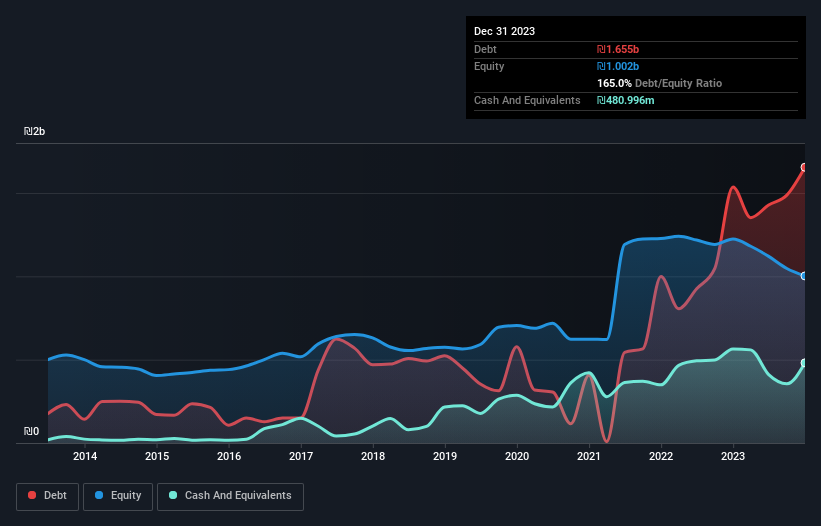
Howard Marks put it nicely when he said that, rather than worrying about share price volatility, 'The possibility of permanent loss is the risk I worry about... and every practical investor I know worries about.' So it might be obvious that you need to consider debt, when you think about how risky any given stock is, because too much debt can sink a company. We note that Electra Consumer Products (1970) Ltd (TLV:ECP) does have debt on its balance sheet. But should shareholders be worried about its use of debt?
When Is Debt Dangerous?
Debt and other liabilities become risky for a business when it cannot easily fulfill those obligations, either with free cash flow or by raising capital at an attractive price. In the worst case scenario, a company can go bankrupt if it cannot pay its creditors. While that is not too common, we often do see indebted companies permanently diluting shareholders because lenders force them to raise capital at a distressed price. Of course, plenty of companies use debt to fund growth, without any negative consequences. When we think about a company's use of debt, we first look at cash and debt together.
See our latest analysis for Electra Consumer Products (1970)
What Is Electra Consumer Products (1970)'s Net Debt?
The image below, which you can click on for greater detail, shows that at December 2023 Electra Consumer Products (1970) had debt of ₪1.65b, up from ₪1.54b in one year. On the flip side, it has ₪481.0m in cash leading to net debt of about ₪1.17b.

How Healthy Is Electra Consumer Products (1970)'s Balance Sheet?
According to the last reported balance sheet, Electra Consumer Products (1970) had liabilities of ₪3.12b due within 12 months, and liabilities of ₪2.88b due beyond 12 months. On the other hand, it had cash of ₪481.0m and ₪672.8m worth of receivables due within a year. So its liabilities outweigh the sum of its cash and (near-term) receivables by ₪4.85b.
The deficiency here weighs heavily on the ₪1.64b company itself, as if a child were struggling under the weight of an enormous back-pack full of books, his sports gear, and a trumpet. So we definitely think shareholders need to watch this one closely. After all, Electra Consumer Products (1970) would likely require a major re-capitalisation if it had to pay its creditors today.
In order to size up a company's debt relative to its earnings, we calculate its net debt divided by its earnings before interest, tax, depreciation, and amortization (EBITDA) and its earnings before interest and tax (EBIT) divided by its interest expense (its interest cover). The advantage of this approach is that we take into account both the absolute quantum of debt (with net debt to EBITDA) and the actual interest expenses associated with that debt (with its interest cover ratio).
Weak interest cover of 0.27 times and a disturbingly high net debt to EBITDA ratio of 7.6 hit our confidence in Electra Consumer Products (1970) like a one-two punch to the gut. This means we'd consider it to have a heavy debt load. Even worse, Electra Consumer Products (1970) saw its EBIT tank 80% over the last 12 months. If earnings continue to follow that trajectory, paying off that debt load will be harder than convincing us to run a marathon in the rain. There's no doubt that we learn most about debt from the balance sheet. But you can't view debt in total isolation; since Electra Consumer Products (1970) will need earnings to service that debt. So when considering debt, it's definitely worth looking at the earnings trend. Click here for an interactive snapshot.
Finally, a business needs free cash flow to pay off debt; accounting profits just don't cut it. So we clearly need to look at whether that EBIT is leading to corresponding free cash flow. During the last three years, Electra Consumer Products (1970) burned a lot of cash. While investors are no doubt expecting a reversal of that situation in due course, it clearly does mean its use of debt is more risky.
Our View
On the face of it, Electra Consumer Products (1970)'s EBIT growth rate left us tentative about the stock, and its level of total liabilities was no more enticing than the one empty restaurant on the busiest night of the year. And furthermore, its interest cover also fails to instill confidence. It looks to us like Electra Consumer Products (1970) carries a significant balance sheet burden. If you play with fire you risk getting burnt, so we'd probably give this stock a wide berth. There's no doubt that we learn most about debt from the balance sheet. However, not all investment risk resides within the balance sheet - far from it. Case in point: We've spotted 3 warning signs for Electra Consumer Products (1970) you should be aware of, and 2 of them are a bit concerning.
If, after all that, you're more interested in a fast growing company with a rock-solid balance sheet, then check out our list of net cash growth stocks without delay.
Valuation is complex, but we're here to simplify it.
Discover if Electra Consumer Products (1970) might be undervalued or overvalued with our detailed analysis, featuring fair value estimates, potential risks, dividends, insider trades, and its financial condition.
Access Free AnalysisHave feedback on this article? Concerned about the content? Get in touch with us directly. Alternatively, email editorial-team (at) simplywallst.com.
This article by Simply Wall St is general in nature. We provide commentary based on historical data and analyst forecasts only using an unbiased methodology and our articles are not intended to be financial advice. It does not constitute a recommendation to buy or sell any stock, and does not take account of your objectives, or your financial situation. We aim to bring you long-term focused analysis driven by fundamental data. Note that our analysis may not factor in the latest price-sensitive company announcements or qualitative material. Simply Wall St has no position in any stocks mentioned.
About TASE:ECP
Electra Consumer Products (1970)
Manufactures, imports, exports, distributes, sells, and services for various consumer electrical products in Israel.
Proven track record low.
Market Insights
Community Narratives



